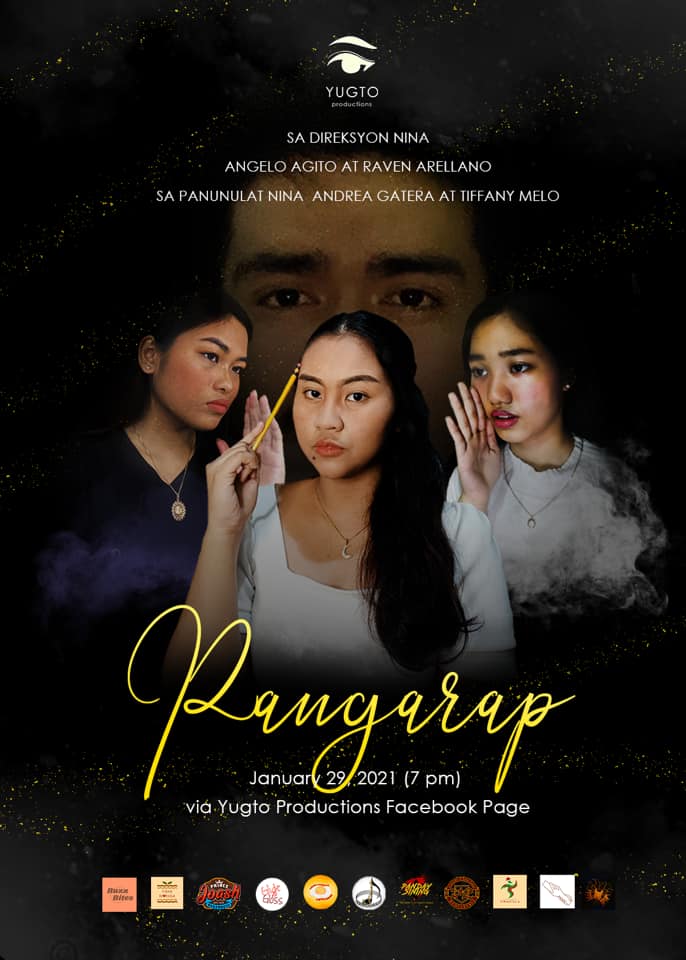By: FATIMA B. BADURIA

The path towards achieving one’s dream is seldom an independent venture as other peoples’ influences constantly leave impressions on the road being paved. Most of the time, this impact comes from their voices, which are powerful enough to reverberate in a person’s mind.
Pangarap, a virtual play by Yugto Productions, has become one of those voices for its viewers. Under the leadership of directors Angelo Agito and Raven Arellano and writers Andrea Gatera and Tiffany Melo, it speaks of the difficulties of chasing one’s ambitions. Due to matters that may be out of one’s control, this relentless pursuit can be diminished. However, despite obstacles, these ambitions can be constantly rekindled through commitment and perseverance.
The play revolves around the struggles of Paula (Jocaz David) chronicled through a Zoom meeting. With a well-laid architectural route imposed by her journalist elder brother, she unveils her hopes of becoming a writer.
In spite of her determination to brew stories, she could only succeed in concocting clichés. Quick to detail this blemish is Dawn (Irish Vistan), with her keen eye on defects and remarkable wariness. To Paula’s rescue, Pash (Cyrille Coronado) arrives in spite of Dawn’s outright disapproval for inviting her. The affirmative and encouraging newcomer contrives a unique storyline, which the aspiring writer immediately takes on.
The narrative’s progress is then impeded by the arguments between Dawn and Pash. Their contrasting perspectives lead to a heated dispute, with Paula caught in the crossfire. This uproar fills her to the brim, causing her to have an outburst. The emotive scene is immediately broken as Robert (John Aldecoa), her elder brother, joins the call.
Despite the buildup, the hints at Paula’s waning mental health end superficially as the play attempts to stay true to a light theme. Although cast as the foreground of the plot, her mental state unravels into loosely sewn fragments of the story. Repeated questions of her having taken her medicine both acknowledge and emphasize her mental illness, but the lack of detail may leave viewers in the dark.
Limitations are also present from the virtual setting, which applies to both viewers and performers. For the audience, overlapping dialogue may be difficult to understand as one voice would overshadow the others. As for the performers, their faces are framed as the main spectacle. This immediately draws attention to their expressions and their occasional drop of character. Losing grip of the emotions, though brief, becomes very noticeable for the audiences. Nevertheless, the actors still remain fresh.
That being said, the virtual stage did not hinder the performance. The production team utilized the platform as if it was a physical stage, including audience-interactive elements. This is clearly exhibited in the blocking of the characters. Most conspicuous is how Dawn and Pash’s frames were always above Paula’s. Moreover, in one scene with Robert, he and Paula are positioned at opposite sides of their abreast frames. This emphasizes the gap between them.
Furthermore, the play concludes with a wonderfully crafted and striking message: passion and mindfulness should blend harmoniously. To do this, one must learn to recognize the power of their own voice, which also needs to remain in consonance with those of others.
In brief, Pangarap succeeds in telling an engaging and relevant tale. It is a compact force that provides inspiration, complementing the doubts and fears arising during the pandemic. To the viewers, the play promotes individual visions and aspirations. Whether feeling the rigid blows of uncertainty or great waves of passion, it has found a way to harmonize with either one. The upshot is a burst of motivation that can truly resonate with audiences. F



